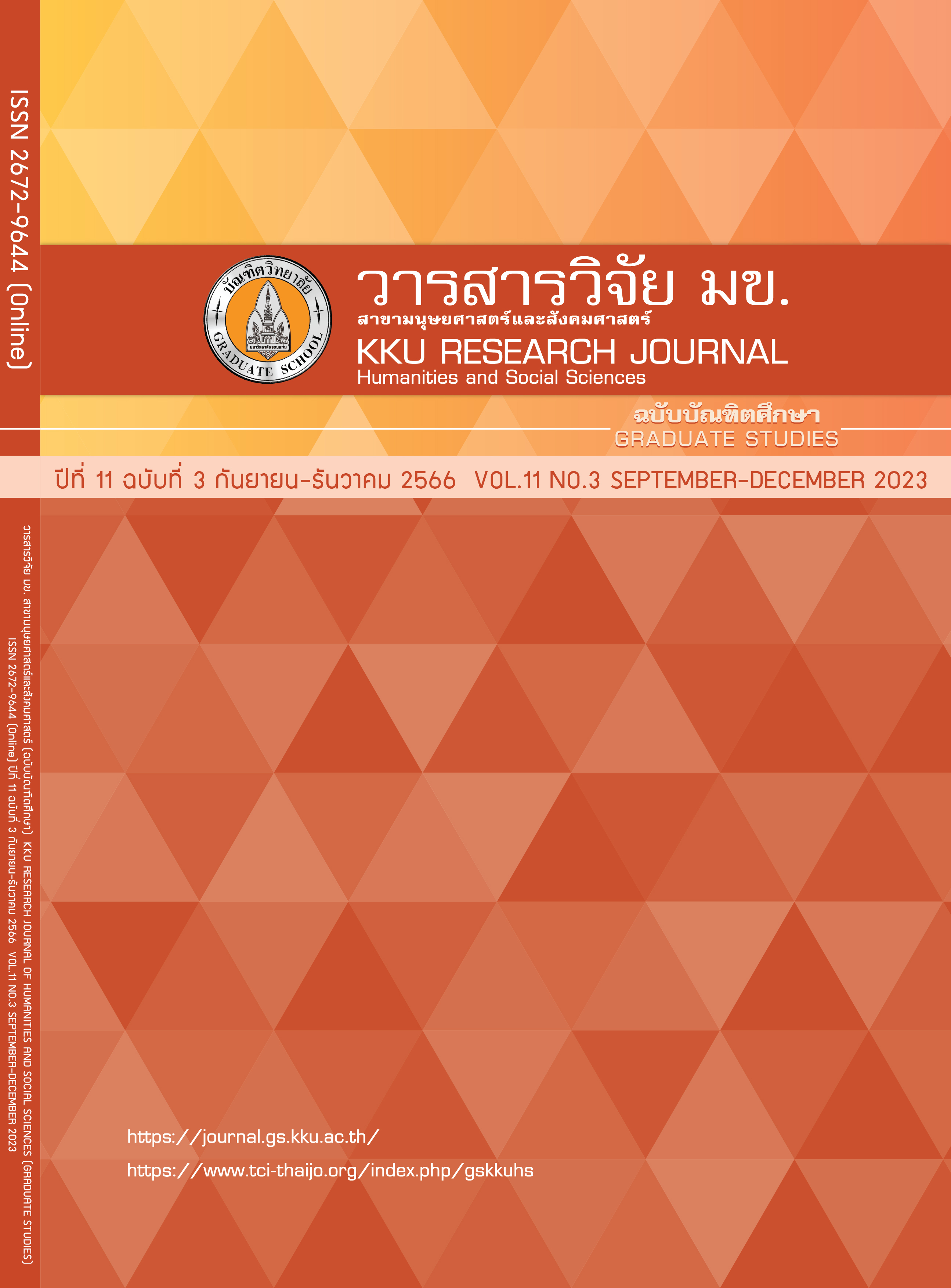The Influence of Intellectual Capital on Sustainable Growth of Thailand’s Savings and Credit Cooperative
คำสำคัญ:
ทุนทางปัญญา การเติบโตอย่างยั่งยืนของสหกรณ์ออมทรัพย์ในประเทศไทยบทคัดย่อ
การวิจัยทางธุรกิจได้รับการวิจารณ์ครั้งแล้วครั้งเล่าว่ายังขาดประเด็นสำคัญที่เกี่ยวข้องกับปัญหาที่โลกกำลังเผชิญอยู่ในปัจจุบัน ดังนั้นผู้วิจัยนี้จึงต้องการพัฒนาความรู้และเติมเต็มช่องว่างทางความรู้เกี่ยวกับความสัมพันธ์ระหว่างองค์กร สิ่งแวดล้อม และสังคม โดยงานวิจัยนี้มีวัตถุประสงค์เพื่อศึกษาอิทธิพลของทุนทางปัญญาต่อการเติบโตอย่างยั่งยืนของสหกรณ์ออมทรัพย์ในประเทศไทยและอิทธิพลขององค์ประกอบทุนทางปัญญาต่อการเติบโตอย่างยั่งยืนของสหกรณ์ออมทรัพย์ในประเทศไทย โดยเก็บข้อมูลจากกลุ่มตัวอย่างเป็นผู้บริหารระดับสูงของสหกรณ์ออมทรัพย์ จำนวน 590 สหกรณ์ ในการวิจัยครั้งนี้ใช้้วิธีการวิเคราะห์การถดถอยแบบพหุคูณ (Multiple regression analysis) เพื่อทดสอบสมมุติิฐาน ผลการวิจัยพบว่า ทุนทางปัญญามีอิทธิพลเชิงบวกต่อการเติบโตอย่างยั่งยืนของสหกรณ์ออมทรัพย์ในประเทศไทย ทั้งนี้ยังพบว่าองค์ประกอบทั้ง 3 ด้าน ได้แก่ ทุนมนุษย์ ทุนโครงสร้าง และทุนสัมพันธ์มีอิทธิพลเชิงบวกต่อการเติบโตอย่างยั่งยืนของสหกรณ์ออมทรัพย์ในประเทศไทยด้วยเช่นกัน
เอกสารอ้างอิง
Yusliza MY, Yong JY, Tanveer MI, Ramayah T, Noor Faezah J, Muhammad Z. A structural model of the impact of green intellectual capital on sustainable performance. Journal of Cleaner Production. 2020.
Tilt CA, Qian W, Kuruppu S, Dissanayake D. The state of business sustainability reporting in sub-Saharan Africa: an agenda for policy and practice. Sustainability Accounting, Management and Policy Journal. 2021; 12(2): 267–96.
Van Buren III HJ. The value of including employees: a pluralist perspective on sustainable HRM. Employee Relations. 2020; 44(3): 686-01
Yang Y, Orzes G, Jia F, Chen L. Does GRI Sustainability Reporting Pay Off? An Empirical Investigation of Publicly Listed Firms in China. Business & Society. 2021; 60(7): 1738–72.
Islam T, Khan MM, Ahmed I, Mahmood K. Promoting in-role and extra-role green behavior through ethical leadership: mediating role of green HRM and moderating role of individual green values. International Journal of Manpower. 2021; 42(6): 1102–23.
Kaawaase TK, Bananuka J, Peter Kwizina T, Nabaweesi J. Intellectual capital and performance of small and medium audit practices: The interactive effects of professionalism. Journal of Accounting in Emerging Economies. 2019; 10(2): 165–89.
Kamukama N. Intellectual capital: company’s invisible source of competitive advantage. Competitiveness Review. 2013; 23(3): 260–83.
Bananuka J, Tauringana V, Tumwebaze Z. Intellectual capital and sustainability reporting practices in Uganda. Journal of Intellectual Capital. 2021.
Kianto A, Sáenz J, Aramburu N. Knowledge-based human resource management practices, intellectual capital and innovation. Journal of Business Research. 2017; 81: 11–20.
Bananuka J, Tumwebaze Z, Orobia L. The adoption of integrated reporting: a developing country perspective. Journal of Financial Reporting and Accounting. 2019; 17(1): 2–23.
Yusoff YM, Omar MK, Kamarul Zaman MD, Samad S. Do all elements of green intellectual capital contribute toward business sustainability? Evidence from the Malaysian context using the Partial Least Squares method. Journal of Cleaner Production. 2019; 234: 626–37.
Nguyen DT, Le TDQ, Ho TH. Intellectual Capital and Bank Risk in Vietnam—A Quantile Regression Approach. Journal of Risk and Financial Management. 2021; 14(1): 27-42.
Inkinen H, Kianto A, Vanhala M, Ritala P. Structure of intellectual capital – an international comparison. Accounting, Auditing & Accountability Journal. 2017; 30(5): 1160–83.
Journeault M, Levant Y, Picard C-F. Sustainability performance reporting: A technocratic shadowing and silencing. Critical Perspectives on Accounting. 2021; 74: 1021-45.
Trarintya MAP, Wiagustini NLP, Artini LS, Ramantha IW. INTELLECTUAL CAPITAL ON CULTURAL SUSTAINABILITY PRACTICES IN MICROFINANCE AT BALI. Academy of Strategic Management Journal. 2021; 20(4): 19-38.
Jordão RVD, Almeida VR de. Performance measurement, intellectual capital and financial sustainability. Journal of Intellectual Capital. 2017; 18(3): 643–66.
Hussinki H, Ritala P, Vanhala M, Kianto A. Intellectual capital, knowledge management practices and firm performance. Journal of Intellectual Capital. 2017; 18(4): 904–22.
Bontis N, Ciambotti M, Palazzi F, Sgro F. Intellectual capital and financial performance in social cooperative enterprises. Journal of Intellectual Capital. 2018; 19(4): 712–31.
Cooperative Promotion Department. Cooperative Business Volume for 2021 [Internet]. 2021 [updated
Aug 31; cited 2022 Feb 26]. Available from: https://drive.google.com/file/d/ 1YKbLk6xK3mzgQc_fVg9QU5hUy9qEB8Fb/view
Cooperative Promotion Department. Total Cooperatives in Thailand [Internet]. 2022 [updated 2022 Mar 31; cited 2022 Apr 1]. Available from: https://drive.google.com/file/d/15UBwJCiZDQmiDquA WKEDY1O7_cOTahN3/view
Podsakoff PM, Organ DM. “Self-reports in organizational research: problems and prospects”. Journal of Management. 1986; 12(4): 531-544.
Green SB. How Many Subjects Does It Take To Do A Regression Analysis. Multivariate Behavioral Research. 1991; 26(3): 499–510.
Baruch Y. Response rates in academic studies-a comparative analysis. Human Relations. 1999; 52(4): 421- 434.
Hair JF, Black WC, Babin BJ, Anderson RE. Multivariate Data Analysis. 7th ed. Upper Saddle River. New Jersey: Prentice Hall; 2010.
Hair JF, Black B, Babin B, Anderson RE, Tatham RL. Multivariate data analysis, 6th ed. Upper Saddle River. New Jersey: Pearson; 2005.
Bayraktaroglu AE, Calisir F, Baskak M. Intellectual capital and firm performance: an extended VAIC model. Journal of Intellectual Capital. 2019; 20(3): 406–25.
Bananuka J, Tumwebaze Z, Musimenta D, Nuwagaba P. Determinants of adoption of International Financial Reporting Standards in Ugandan micro finance institutions. African Journal of Economic and Management Studies. 2019; 10(3): 336–55.
ดาวน์โหลด
เผยแพร่แล้ว
รูปแบบการอ้างอิง
ฉบับ
ประเภทบทความ
สัญญาอนุญาต

อนุญาตภายใต้เงื่อนไข Creative Commons Attribution-NonCommercial-NoDerivatives 4.0 International License.




